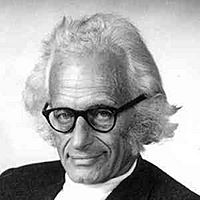Herbert Fröhlich facts for kids
Quick facts for kids
Herbert Fröhlich
|
|
|---|---|

Herbert Fröhlich (1905–1991)
|
|
| Born | 9 December 1905 Rexingen, Württemberg, German Empire
|
| Died | 23 January 1991 (aged 86) Liverpool, England, UK
|
| Nationality | British |
| Alma mater | Ludwig-Maximilians University |
| Known for |
|
| Spouse(s) | Fanchon Fröhlich |
| Awards |
|
| Scientific career | |
| Fields | Physicist |
| Institutions |
|
| Doctoral advisor | Arnold Sommerfeld |
| Doctoral students |
|
| Other notable students |
|
| Signature | |
| Notes | |
|
He is the brother of the mathematician Albrecht Fröhlich.
|
|
Herbert Fröhlich (born December 9, 1905 – died January 23, 1991) was a brilliant physicist. He was born in Germany but later became a British citizen. He is famous for his work on how materials behave, especially at very cold temperatures, and also for his ideas about how energy works in living things.
Contents
A Physicist's Journey
Herbert Fröhlich started studying physics in 1927 at Ludwig-Maximilians University in Munich, Germany. He earned his highest degree, a doctorate, in 1930. His teacher was a famous physicist named Arnold Sommerfeld.
Moving Due to Difficult Times
After his studies, Fröhlich worked at the University of Freiburg. However, because of growing unfair treatment against Jewish people and a movement called "Deutsche Physik" (German Physics) under Adolf Hitler, he had to leave Germany. In 1933, he moved to the Soviet Union to work at the Ioffe Physico-Technical Institute in Leningrad.
He faced danger again during a time known as the Great Purge, where many people were arrested or killed. So, in 1935, he quickly moved to England. He worked at the University of Bristol until 1948, becoming a senior researcher. Later, he was invited by another famous scientist, James Chadwick, to become a professor at the University of Liverpool.
Life and Research
In 1950, a big company, Bell Telephone Laboratories, offered Fröhlich a special professor job at Princeton University in the United States. But he chose to stay at Liverpool because he could focus only on his research there. He had also just married an American woman, Fanchon Fröhlich, who was studying in England and did not want to go back to the U.S. at that time.
From 1973, he was a professor at the University of Salford. However, he kept an office at the University of Liverpool, where he became a professor emeritus (a retired professor who keeps their title) in 1976. He stayed there until he passed away. In 1981, he was a visiting professor at Purdue University. His important work led to him being nominated for the Nobel Prize in Physics in both 1963 and 1964.
Understanding Energy in Materials
Fröhlich did important research in areas like superconductivity. This is a cool topic about how some materials can carry electricity with no resistance at very low temperatures. He also studied bioelectrodynamics, which looks at how electricity and energy work in living things.
He came up with a special idea called Fröhlich coherence. This theory suggests that biological systems can create organized energy waves. When a system reaches this organized state, it's called a Fröhlich condensate. It's a bit like a Bose-Einstein condensate, but for living systems and at normal temperatures.
Awards and Recognition
Herbert Fröhlich received many honors for his work. In 1951, he was chosen as a Fellow of the Royal Society (FRS), which is a very high honor for scientists in the UK. In 1972, he was given the Max-Planck Medal by the German Physical Society. He also received an honorary doctorate from Purdue University in 1981.
Family Life
Herbert Fröhlich was the son of Fanny Frida and Jakob Julius Fröhlich. His family had lived in Rexingen, Germany, for a long time. His brother, Albrecht Fröhlich, was also a very smart person and became a famous mathematician. Albrecht was also elected a Fellow of the Royal Society in 1976.
 | Toni Morrison |
 | Barack Obama |
 | Martin Luther King Jr. |
 | Ralph Bunche |

